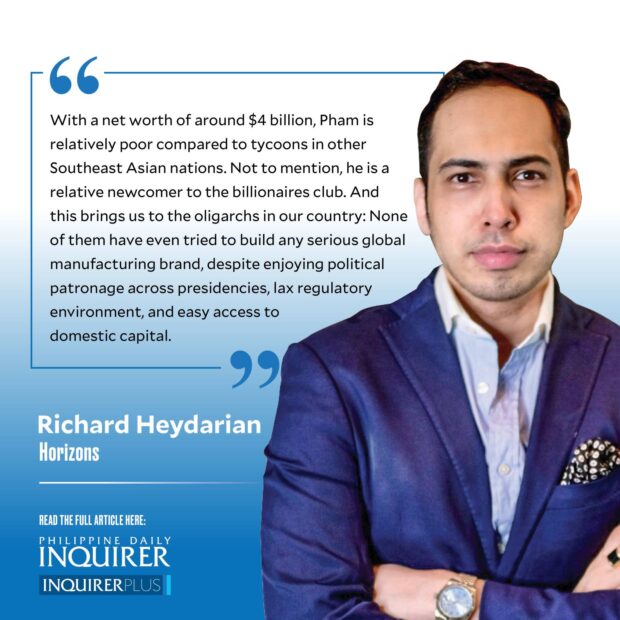Vietnam and the Philippines: Varieties of tycoons
Da Nang—In some ways, Vietnam is a land of remarkable continuity. Navigating the country’s traffic remains as daunting as ever: pedestrian lanes cutting across whole boulevards without any traffic lights in sight. Navigating the country’s vibrant cities, thus, remain as exhilaratingly risqué as ever. But scratch the surface, or, actually, just look at the surface and one may seamlessly discover how this astonishingly dynamic nation is, indeed, on the move. I mean, literally.
Whereas a decade ago, one would see mostly humble motorbikes, annoyingly noisy but leisurely in pace, gracing the country’s biggest cities, nowadays fast-paced German luxury cars are a ubiquitous sight. Not to mention, the cliché red Ferraris awkwardly parked next to rundown neighborhoods. Yes, screams nouveau riche.
Article continues after this advertisementBut what has truly impressed me about Vietnam is not the site of Porsches and BMWs, as impressive as those cars can be, but instead, what is arguably Southeast Asia’s first truly global car: VinFast. No offense to Malaysia’s Proton, which, four decades in, is largely an assembly line for foreign car brands. In barely half a decade, I personally witnessed, throughout countless trips to Vietnam, the astonishing transformation of a once curious novelty into a new player in the international electric vehicle market.
Founded as recently as in 2017, the Vietnamese dynamo moved into a cutthroat international market just four years later, launching a sales office in Europe and America. A year later, VinFast announced the establishment of a new manufacturing facility in Pittsboro, North Carolina. The same year, the Vietnamese company expressed interest in establishing a factory in no less than Germany, with plans of producing up to 250,000 vehicles by 2025.
What makes VinFast special is not only the speed of its global expansion, but also its audacity to immediately compete with other premium brands: A VinFast VF 8 model, for instance, is actually more expensive than an entry-level Tesla ($42,990). Surely, it has been far from smooth sailing for the Vietnamese upstart, with the upstart company posting $2.4 billion in losses from 2021 to 2022. Not to mention the delivery delays and technical concerns that hounded VinFast’s push into the world’s most sophisticated markets.
Article continues after this advertisementNevertheless, the company’s owner, Pham Nhat Vuong, a Soviet-educated entrepreneur who made his first million selling instant noodles in Ukraine, is bent on realizing his dream of creating Southeast Asia’s first “chaebol,” namely Korean-style conglomerates operating cutting-edge technology and manufacturing. Despite major domestic political shakeups, which triggered the departure of the country’s former president and stroke fear into the hearts of politically connected tycoons, Vietnam is determined to nurture its new national champions with a package of proactive trade and industrial policies.
With a net worth of around $4 billion, Pham is relatively poor compared to tycoons in other Southeast Asian nations. Not to mention, he is a relative newcomer to the billionaire club. And this brings us to the oligarchs in our country: None of them have even tried to build any serious global manufacturing brand, despite enjoying political patronage across presidencies, lax regulatory environment, and easy access to domestic capital.
As Japanese economist Yoshihara Kunio puts it, countries such as the Philippines have had a bizarre case of “technologyless industrialization” despite a plethora of legislations, including the Investment Incentives Act in 1967, to spur national development. Joe Studwell, the author of “Asia’s Godfathers,” explains it best: Typical tycoons are not true innovators like their counterparts in South Korea, Japan, Taiwan, and now even in Vietnam, but instead “just highly effective traders in rent-offering environments.” The result, Studwell argues, is “to make domestic goods and services … more expensive than they would otherwise be and to limit the growth of globally competitive companies.” Wondered why the Philippines, among the poorest nations on earth, has the third highest cost of living in the region just behind Singapore and Thailand!?
Whatever high growth we have achieved in recent years is neither the result of self-styled oligarchs’ “entrepreneurialism” nor the supposed policy genius of our politicians. As Studwell correctly argues, we instead owe whatever little prosperity we enjoy to the sacrifices of our “smaller-scale local businesses” and the “hard work and thrift of ordinary [folks],” especially those working in export-oriented factories as well as millions of Filipinos working overseas to support their families back home.
—————–
rheydarian@inquirer.com.ph

















